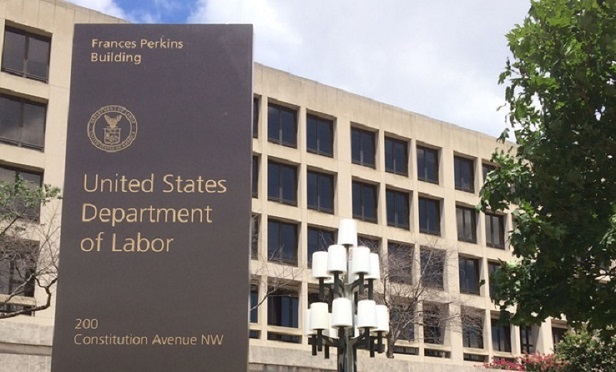
 DOL headquarters (Photo: Michael A. Scarcella/ALM)
DOL headquarters (Photo: Michael A. Scarcella/ALM)
The Labor Department announced Monday that financial institutions should be allowed to continue to rely upon the temporary enforcement policy set out in its fiduciary rule, pending the department's issuance of additional guidance, which it plans to issue "in the future."
The Department states in its Field Assistance Bulletin No. 2018-02 that it is "convinced that this temporary enforcement relief is appropriate and in the interest of plans, plan fiduciaries, plan participants and beneficiaries, IRAs and IRA owners."
Labor's Employee Benefits Security Administration notes that on Monday the U.S. Court of Appeals for the 5th Circuit is expected to issue a mandate "effectuating its opinion vacating the entire fiduciary rule, the [best-interest contract] exemption, the principal transactions exemption, and related amendments to existing PTEs."
Labor had until April 30 to appeal the 5th Circuit's decision and did not do so.
For the period from June 9, 2017 — when the rule's Impartial Conduct Standards took hold — until after regulations or exemptions or other administrative guidance has been issued, Labor states that it "will not pursue prohibited transactions claims against investment advice fiduciaries who are working diligently and in good faith to comply with the impartial conduct standards for transactions that would have been exempted in the BIC exemption and principal transactions exemption, or treat such fiduciaries as violating the applicable prohibited transaction rules."
While Labor intends to provide "appropriate guidance in the future," it is aware that some financial institutions "may be uncertain as to the breadth of the prohibited transaction exemptions that remain available for investment advice fiduciaries following the court's order."
The uncertainty about fiduciary obligations and the scope of exemptive relief, Labor states, "could disrupt existing investment advice arrangements to the detriment of retirement plans, retirement investors and financial institutions."
Labor further states that financial institutions "have devoted significant resources to comply with the BIC exemption and the principal transactions exemption and may prefer to continue to rely upon the new compliance structures."
Barbara Roper, director of investor protection for the Consumer Federation of America, told ThinkAdvisor Monday after reviewing Labor's bulletin that "this is just further evidence that DOL is willing to bend over backwards to accommodate the firms, and throwing retirement savers under the bus in the process."



